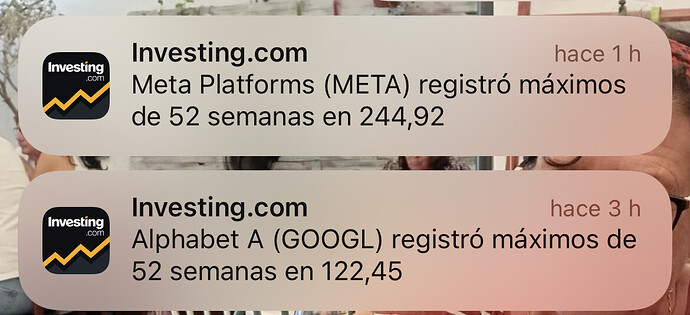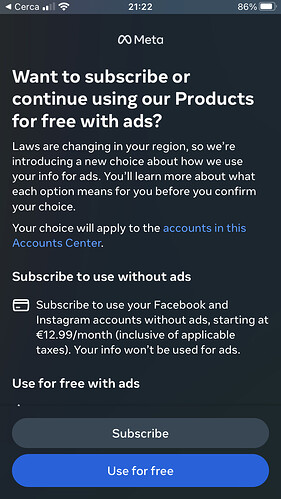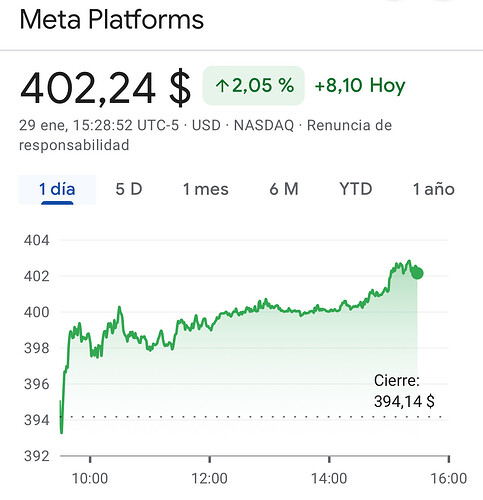¿No iban a desaparecer las dos hace unos meses?
En Alphabet me precipité y estoy a cero ahora. En Meta ya he superado el 100%, lástima que fuera una posición pequeña.
A las puertas del 200% en menos de un año:
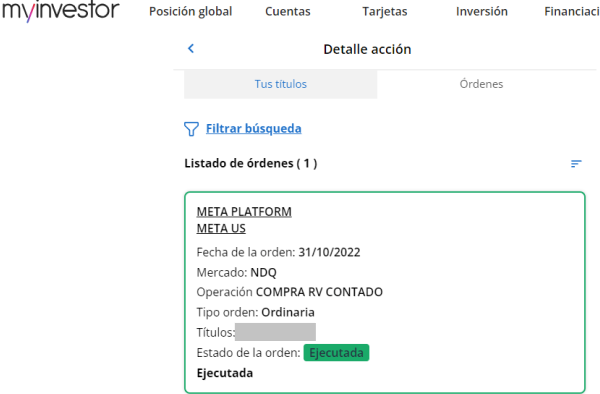
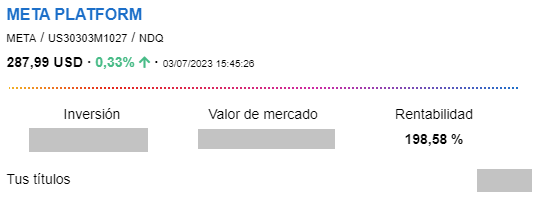
Es acojonante macho los meneos que metieron a una empresa que capitaliza más que muchos países.
Se acababa el mundo con tik tok, la competencia era bestial, la manera de anunciarse iba a cambiar de repente…
No ha tenido en cuenta la IA Sr. Camacho, ahora vale por lo menos el triple ![]()
KEY POINTS
- Almost a decade after purchasing WhatsApp for $19 billion, Facebook parent Meta is still trying to turn the messaging app into a big moneymaker.
- Alice Newton-Rex, WhatsApp product director, tells CNBC that the focus is on business messaging.
- WhatsApp remains much less popular in the U.S. than in other countries like Brazil and India.
In this article
Follow your favorite stocksCREATE FREE ACCOUNT
It’s been almost a decade since Facebook founder Mark Zuckerberg shocked the tech world, announcing his company’s agreement to spend $19 billion on WhatsApp, a popular messaging app with a tiny business.
Since then, WhatsApp has remained somewhat of an anachronism. Usage has continued to grow, with more than 2 billion people now counting on the app to chat with friends and family, up from 450 million at the time of the acquisition. But it’s still not much of a moneymaker.
Unlike Instagram, which Facebook bought in 2012 for the much tidier sum of roughly $1 billion, WhatsApp doesn’t show ads, which is Zuckerberg’s core business. It’s also unrelated to his company’s hugely expensive pivot to the metaverse or its effort to catch up to TikTok with its short video product, Reels.
But the company now known as Meta has no intention of sidelining WhatsApp. Rather, Zuckerberg regularly touts the value of the asset and its potential to expand, boasting on Meta’s latest earnings call about the 200 million people who use the WhatsApp Business app, which helps companies communicate with clients. He told CNBC’s Jim Cramer in June 2022 that WhatsApp represents the “next chapter” for Meta.
To parlay its massive user base into a product that contributes in a big way to the bottom line, WhatsApp needs more large businesses across the globe to rely on the service as a main way to converse with customers. For each conversation, companies pay in the range of a half-cent to 15 cents, depending on the kind of chat and the country in which the exchange takes place.
“It’s been clear for many years that people are trying to connect with businesses on WhatsApp,” said Alice Newton-Rex, the unit’s product director, in an interview with CNBC. “If you go to India or Brazil and you look around, you’ll see WhatsApp numbers posted up in shop windows everywhere. This is how businesses want to engage with their customers.”
Consumers in India, for example, use WhatsApp to book Uber rides and get movie recommendations on their Netflix accounts.
Newton-Rex joined WhatsApp four years ago, leaving her high-level position at London-based financial firm WorldRemit for the new gig. At the time, WhatsApp only had 15 product managers, a number that’s since ballooned to 90.
The product group is now tasked with building features that can unlock WhatsApp’s business in a substantial way and in helping WhatsApp fulfill the potential that Zuckerberg has long seen in the app.
Newton-Rex said Zuckerberg has been “a big part of the team,” adding that he regularly speaks with Will Cathcart, the current head of WhatsApp.
“He’s a big part of our strategy,” she said about Zuckerberg’s support of WhatsApp and its road map.
WhatsApp’s popularity around the world is undeniable. In countries like Brazil, India and Indonesia, people use it to chat with family and friends and stay updated on current affairs. There’s particular appeal in countries that historically lacked robust telecommunications infrastructure, as WhatsApp has made it feasible for people in those regions to affordably communicate via smartphone.
“Back in 2009, it was extremely expensive to send a text message, and if you wanted to make a call or particularly an international call, that might set you back hundreds of dollars,” Newton-Rex said. “WhatsApp changed all that.”
Newton-Rex recalled the time a member of the app’s research group compared WhatsApp to oxygen.
“I think the idea that it’s sort of everywhere and it’s effortless to use, you maybe don’t think too deeply about using it, but you would be in real trouble if someone took it away,” she said.
What’s up with WhatsApp’s business?
But for analysts and investors, WhatsApp’s true value to Meta has long been unclear. The company doesn’t reveal the size of the business. Nick Lane, founder of research firm Mobilesquared, estimates its revenue to be between about $500 million and $1 billion, equaling less than 1% of Meta’s total sales.
Instagram, by contrast, will bring in a projected $40 billion in revenue this year, according to Debra Aho Williamson, an analyst at Insider Intelligence.
“Facebook bought WhatsApp nearly nine years ago — It’s a long time to have an app that has enormous usage, but where’s the revenue?” Williamson said with a chuckle. “We’ve kind of been watching it for years and years going, ‘OK, guys.’”
The business challenge for WhatsApp dates back to its origins. Co-founders Jan Koum and Brian Acton publicly lambasted the advertising industry in a 2012 blog post, writing that “no one wakes up excited to see more advertising, no one goes to sleep thinking about the ads they’ll see tomorrow.”
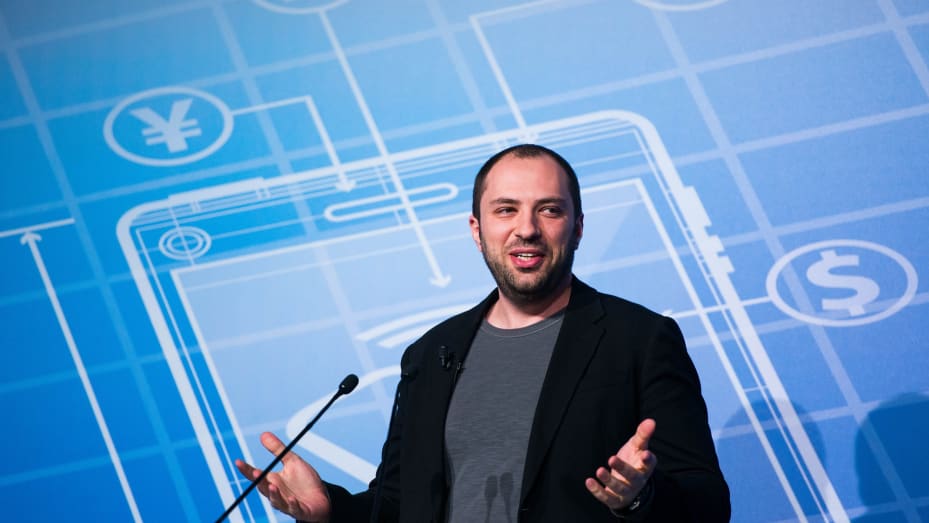
Former WhatsApp CEO and co-founder Jan Koum
David Ramos | Getty Images
In the years after the Facebook deal, Koum and Acton reportedly clashed with executives over issues related to data privacy and monetizing WhatsApp. Acton left in 2017, and Koum followed him out the door a year later.
It’s not just an issue of privacy and morals. As Williamson noted, WhatsApp’s core function as an encrypted platform for people to send each other private messages isn’t particularly “conducive to advertising.” Does a user really want a McDonald’s promotion to pop up alongside private messages with family members?
Yet throughout its almost two decades, Facebook has never had much of a business outside of ads, even as it’s expanded into consumer gadgets and the metaverse and, in the case of WhatsApp, getting companies to pay for messaging.
The plan is five years in the making. Meta kick-started its WhatsApp Business app in 2018, pitching it as a way for companies to more easily communicate with users through verified commercial accounts and a suite of in-app tools. In June, Meta said the WhatsApp Business app had quadrupled in the past three years to 200 million monthly active users.
Small companies can use the app for free or, depending on the country, pay a monthly subscription for added features like the ability to build a WhatsApp website, and to access a corporate account on up to 10 devices. Larger companies can pay for more expansive messaging campaigns and features to help them provide more customer service and support to big audiences via the WhatsApp Business platform.
With the upper-tier service, Meta charges per conversation, and the fee varies. In Brazil, for instance, a brief authentication conversation in which users are prompted to enter one-time passcodes for verification could cost a company 3.15 cents, while more complicated and extended marketing conversations detailing new promotions or special deals may cost 6.25 cents.
Meta said in its most recent annual report that sales in the company’s “Family of Apps-other revenue” segment, which houses the WhatsApp Business platform and other revenue sources like the net fees Meta receives from developers using its payment infrastructure, grew 12% year over year to $808 million in 2022.
While companies can’t run online ads on WhatsApp, they can buy a special kind of ad that’s now core to WhatsApp’s business strategy called “click-to-message,” which essentially redirects Instagram and Facebook users to WhatsApp to initiate an immediate conversation, Newton-Rex said.
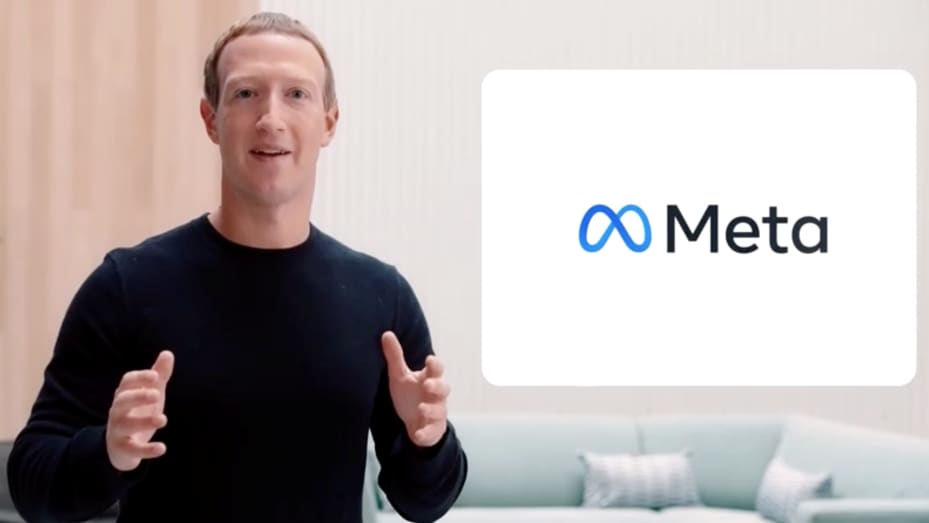
Mark Zuckerberg told the world in October 2021 that he was rebranding Facebook to Meta as the company pushes toward the metaverse.
Facebook | via Reuters
It’s a strategy Meta is deploying more broadly. Zuckerberg said last year that the company’s click-to-message ad products running across WhatsApp, Messenger and Instagram are generating about $9 billion in annualized revenue. Most of those sales stem from the company’s Messenger app, which was first to offer that type of ad, but Zuckerberg said that the WhatsApp-specific click-to-message ads “just passed a $1.5 billion run rate, growing more than 80% year over year.” Meta says that all rolls up to total ad revenue and is not housed within WhatsApp.
More recently, Zuckerberg said during Meta’s first-quarter 2023 earnings call that the company’s click-to-message ads reached $10 billion in annualized revenue and added that “paid messaging on WhatsApp — has grown by 40% quarter over quarter,” without giving a revenue figure.
In addition to the newer ad products, Newton-Rex also highlighted WhatsApp’s Channels feature, which Meta debuted in June. The new tool, which is akin to a similar feature available in the Telegram messaging app, is intended to function like a “private broadcast service,” separate from the core WhatsApp messaging that takes place between friends and family members. It lets organizations and power users create their own channels to send messages or post updates and polls to large groups of people.
Although Channels is currently only available in a few countries, including Colombia and Singapore, Newton-Rex said Meta has bigger plans in store for the product and is considering ways to make money from it.
“Maybe you’ll be able to subscribe to a channel and you’d pay a small fee to hear from a news outlet or some celebrity who you cared about,” Newton-Rex said. “That could include also allowing channel owners to promote their own channel in our directory.”
As a broadcast tool, Channels isn’t an encrypted service. In the future, WhatsApp may allow groups like nonprofits or health organizations to ensure communications are encrypted for user or patient protection, the company said.
In looking for other ways to make money from Channels, ads could be an option, as there’s now a way for companies to run promotions without forcing them into a stream of confidential messages.
“We’re looking at a whole range of different monetization opportunities,” Newton-Rex said. “We haven’t fixed on any one thing yet.”
Cracking the U.S.
For all of Meta’s focus on WhatsApp expansion, the U.S. remains an elusive market, even though it’s a huge part of the parent company’s business. In the latest quarter, the U.S. and Canada combined accounted for 45% of Meta’s revenue.
According to Insider Intelligence data released in May, WhatsApp user penetration around the world was the highest in Spain, Italy and Argentina. In each country, at least 80% of internet users accessed WhatsApp once a month or more. In the U.S., that number was just 21.8%.
Still, Newton-Rex called North America WhatsApp’s “fastest-growing region,” without elaborating.
Researchers have found that the people in the U.S. most likely to use WhatsApp come from immigrant communities with extended family in other countries. The Pew Research Center has previously detailed that WhatsApp is the most popular messaging app used by Hispanic Americans.
For “a lot of people around the world who don’t use so many different internet services, WhatsApp is their gateway into having interactions on the internet,” Newton-Rex said.
Because WhatsApp uses encryption technology, it’s also attractive for people in countries with more repressive government regimes, while consumers in the U.S. are generally comfortable using Apple’s iMessage as well as direct messages on Facebook and X, formerly known as Twitter.
Newton-Rex said part of WhatsApp’s marketing strategy in the U.S. focuses on the app’s encryption technology, because data privacy often “comes up as an absolute top concern” for users. Last year, the company debuted a major promotional campaign highlighting WhatsApp’s encryption features.
Meta has been hammered in recent years by a number of data privacy blunders, such as the Cambridge Analytica scandal, scarring the company’s reputation.
“People really do know how important end-to-end encryption is,” Newton-Rex said. “They know that they don’t want their messages to be vulnerable to hackers, criminals, oppressive governments or anyone else who’s trying to listen in.”
Meanwhile, as Meta and other tech giants pour billions of dollars into generative artificial intelligence, Zuckerberg recently said his company plans to include more advanced chatbots into WhatsApp and other messaging tools.
Newton-Rex said Meta’s push into generative AI could assist in the development of more kinds of “business applications.”
“I think that messaging is going to be the main way that people interact with generative AI in future,” she said. “Imagine being able to have a really easy, instant, real-time conversation whenever you wanted to get customer service or to buy something with a business who you wanted to transact with. But it’s not just business applications.”
The global business messaging space is currently worth about $32 billion and is dominated by SMS, or short message service, technology that’s used to send things like status updates on airplane flight changes, Mobilesquared’s Lane said.
Lane said WhatsApp has the opportunity to offer more compelling ways for businesses to communicate with customers beyond short, simple text messages.
“For example, if you’re a restaurant, you can put your whole menu, different pages of your menu on WhatsApp,” Lane said. “The experience that you can have on a website or on an app, you can now have that within the messaging experience.”
That looks like a far-off promise, at least in the North American market. Williamson from Insider Intelligence said she does “not see any leap in usage of WhatsApp in the U.S.” in the near future.
Si no me equivoco, muchas empresas están haciendo uso de este servicio para sus departamentos de atención al cliente, sin ir más lejos Inditex atiende por whatsapp sus reclamaciones. Es una alternativa bastante atractiva para suplantar los chats de las páginas corporativas que tan mala experiencia dan.
Lo veo una vía bastante interesante, ya que a día de hoy todo el mundo tiene whatsapp en el bolsillo, de forma estable y dando una mejor experiencia para gestionar este servicio de atención al cliente para las empresas.
PD: Añado, que no hay que escribir a un número en concreto el cual tendrías que añadir a la agenda y demás, sino que por el contrario abres una conversación directa a través de un enlace y te genera una conversación más en tu lista de conversaciones con una cuenta verificada por Whatsapp, por cierto una conversación que queda guardada el tiempo que tu quieras, pudiendo así gestionarla por tu cuenta, a diferencia de los chats corporativos, donde una vez te cierran la conversación, o se cae por problemas técnicos la conversación suele cerrarse y perderse.
La pregunta es si esas ventas a empresas son capaces de compensar no solamente los costes de esa actividad, sino la de tener millones de usuarios que directamente no producen ningún ingreso.
Entiendo que las empresas están dispuestas a pagar un precio razonable siempre y cuando Whatsapp sea una herramienta de uso muy mayoritario.
La respuesta probablemente sea que la principal función de Whatsapp es aportar datos que difícilmente se podrían obtener de otra manera, y que complementan a los obtenidos en Facebook e Instagram. En Instagram podríamos decir que normalmente sus usuarios muestran una imagen edulcorada de sus vidas, y esto permite obtener datos para los anunciantes, pero son en las conversaciones privadas de Whatsapp donde los usuarios dan pistas más profundas de su situación real (incluso para usuarios de Instagram como un servidor, que nunca ha subido nada a mi perfil, pero sin embargo como sí tengo Whatsapp me suele aparecer publicidad que me interesa -también damos pistas sin subir contenido, por ejemplo con los me gusta, pero seguramente no sería suficiente para que los anunciantes segmenten como ahora segmentan conmigo-).
¿Cuánto vale eso? Difícil de valorar, pero si no existiese en el grupo seguro que las cuentas se resentirían, y la competencia lo tendría más fácil para confrontar con Meta.
He leído un poco por encima el artículo que comparte @Rawdo y por lo que veo en estos otros sitios: A la caza de tus datos: estos son todos los metadatos que WhatsApp capta cuando utilizas sus servicios.
Creo que no funciona exactamente así. Es decir, Meta no hace un escaneo de tus conversaciones y si hablas mucho de coches te ofrece imágenes de coches en Instagram.
Lo que sí hace es que si recibes muchos enlaces de gatetes en whatsapp con origen en alguna plataforma de Meta, cuando entres en alguna de esas plataformas te va a ofrecer gatetes.
De hecho, por lo que he leído por encima en la propia web de Whastapp, los datos que recopilan nuestros que son (no aplica para UE):
Cita Actualmente, WhatsApp comparte ciertas categorías de información con las empresas de Meta. Entre los datos que compartimos con las demás empresas de Meta se incluyen la información de registro de tu cuenta (como tu número de teléfono), datos de operaciones (por ejemplo, si usas Facebook Pay o Tiendas en WhatsApp), información relacionada con el servicio, información sobre cómo interactúas con las empresas cuando usas nuestros servicios, información sobre tu dispositivo móvil y la dirección IP; además, es posible que compartamos otros datos según se describe en la sección “Información que recopilamos” de la Política de privacidad, así como la información que obtengamos con tu consentimiento o mediante previo aviso.
Limitamos significativamente la información que compartimos con Meta. Por ejemplo, siempre protegeremos tus conversaciones personales con cifrado de extremo a extremo, de modo que ni WhatsApp ni Meta puedan ver esos mensajes privados. No mantenemos registros de los contactos a los que nuestros usuarios llaman o envían mensajes, ni podemos ver las ubicaciones que se comparten, por lo que no podemos compartir ni compartimos esta información con Meta. Necesitamos tus contactos para proporcionarte nuestro servicio, pero no los compartimos con Meta. Puedes obtener más información sobre estas limitaciones aquí.
Tengo la sensación de que si Instagram te está ofreciendo actualmente coches, es porque entras en perfiles donde se hablan de coches, te paras a ver reels de coches (miden el tiempo que te tiras viendo cada publicación), en su buscador buscas coches y quizá recibas algún enlace a instagram en Whatsapp sobre coches. Pero el peso de las primeras variables debería ser mucho mayor que el de Whatsapp.
No sé si es usuario de Instagram, pero se nota rápido cuando le ofrecen a uno publicidad que nunca le habían ofrecido, y que solo tiene sentido que le ofrezcan si viene de hablar mucho sobre un tema por WhatsApp.
Le pongo un ejemplo, un amigo cercano acaba de ser padre, el primero de mis amigos, y he hablado bastante con él sobre temas relacionados con la paternidad. Pues desde entonces no han parado de aparecerme anuncios de productos para bebé.
Es desde luego solo experiencia empírica, pero me pasa cada X tiempo y si pregunta a otras personas que sean usuarias seguro que también se lo confirman. Es desde luego difícil de probar, y si no lo hubiera experimentado directamente diría lo mismo que usted, pero es lo que he vivido.
Otro ejemplo. Me venía doliendo desde hace bastante tiempo una rodilla después de salir a correr, o tras estar mucho tiempo de pie, y tras al traumatólogo pues resulta que tengo una lesión en el cruzado. Nada que requiera operación, pero sí fortalecer más los músculos que dan estabilidad a la rodilla. Bueno pues un buen amigo es médico de familia y le encanta hacer bici, y lleva un mes tratando de convencerme de las bondades del deporte, pero a mi no me llama demasiado. No he buscado nada relacionado con el ciclismo en Instagram, ni voy dando me gusta a nada relacionado porque no me interesa, pues no paran de aparecerme anuncios de bicis caras ![]()
Igual es cosa mía, pero me parece complicado.
Perdón de antemano, llevo tiempo sin escribir y se me escapó el tuteo.
Pues estoy en la misma situación que su amigo, pero en mi caso no me empezaron a aparecer cosas de bebés hasta que yo empecé a buscarlas/pararme en reels de instagram…y como entenderá, las conversaciones en mi Whatsapp han pasado a ser un 90% relacionadas con bebés ![]() . Eso sí, no hemos intercambiado links sobre nada de bebés, ni tengo facebook.
. Eso sí, no hemos intercambiado links sobre nada de bebés, ni tengo facebook.
Desde luego que no tengo intención por enmendarle la mayor, pero en uno de los links que le pongo está lo que dice la propia Apple sobre la información que le llega a meta sobre nuestro uso de Whatsapp. No sé si en el caso de Android la cosa cambia.
Lo que vengo a decir es que quizá su amigo le haya hecho llegar links sobre algunos temas relacionados con las bicicletas o en el mismo instagram (dado que usted hace deporte) le haya sugerido algún video/post sobre el que haya pasado el tiempo suficiente como para que el “cerebro” de Meta piense que empieza a estar interesado en ello. Que en eso sí, en cuanto detectan un “ligero” nuevo interés te bombardean con ello como si no hubiera mañana.
Nada de hecho las redes sociales le dan repelús, no tiene ninguna ![]()
Pero bueno se agradece lo que me cuenta, no dejamos de estar sesgados por nuestra propias experiencias.
Bueno, yo tengo también un punto de vista personal y obviamente será discutible. Pero Whatsapp es parte de todo el ecosistema de datos y publicidad que ostenta Meta, quizás sea una de las ramas menos visibles desde fuera, pero con ella tienen el canal de comunicación entre particulares dominante en todo el mundo (a excepción quizás de China y algunos países del entorno) y esto es algo muy poderoso, que no solo te da la opción de monetizar directamente como se dice en el artículo con Whatsapp empresas, sino que también nutre o podría nutrir de forma muy poderosa al negocio de publicidad de Meta como conglomerado.
No todo es tan observable de primera vista, a veces hay segundos razonamientos que te conducen al porqué de las cosas. Por hacer un símil con muchos matices, podríamos poner a Ryanair, esta aerolínea comercializa vuelos para particulares con unos precios y unos márgenes por sus vuelos que también harían cuestionar a cualquier su viabilidad, sin embargo aunque parezca poco intuitivo para una “aerolínea”, el precio de sus billetes no es esencialmente su negocio, sino su canal, ya que durante los viajes tienen a cientos de personas montadas en “su canal” a los cuales pueden satisfacer ofreciendo sus servicios comerciales que si tienen unos márgenes suculentos.
PD: Quiero matizar, que casi todo está escrito en condicional y el ejemplo es de cosecha propia, que como he dicho tiene muchos matices y solo sirven como aproximación. Ya que en este tema, como en otros muchos hay realmente poca información de como funciona el negocio de Whatsapp y cuales son las intenciones de la compañía, pero lo que si está claro es que su intención no es la de perder dinero (aunque finalmente pueda ocurrir).
Parece inventado, no lo es.
Hoy, por Whats, he mantenido una conversación con un grupo de amigos con los que salgo en moto. Hemos pasado a comentar un viaje por los Pirineos de hace un par de días, unas fotos que he enviado en las que se ve mi majestuosa calva, que si estamos todos ya viejos, que si tú tienes 71 y aparentas 93, que si los reflejos ya no son lo que eran, la cosa se ha ido animando, que si patatín, que si patatán, en fin, que a mí me incineren, aquel un sepelio de cuerpo presente con orquesta y que cante Raphael, el otro quiere que lo metan en una bota de vino, reírnos un poco de lo que es la triste realidad.
Pues bien, cambio de aplicativo y, por primera vez, primera, de audífonos y ascensores mecánicos ya había recibido alguno, el anuncio me explica que lo mío es comprar ahora un nicho en tierra en el majestuoso vial del Paseo de los Tilos que una funeraria promociona como lo más “in” en materia de descanso eterno. Atención, aquí viene lo bueno, “donde sus cenizas descansarán en el entorno que Ud. desea”. No quiero enterarme de lo que le habrá salido al de la bota de vino, lo mismo lo invitan a una cata para tomar medidas.
No se como lo hacen, pero que monetizan, lo tengo claro. De momento, de cascos, botas y toda la parafernalia, no me ha llegado nada, deben pensar que, en mi caso, morirme, es lo más probable.
… y eso que las comunicaciones están “encriptadas” punto a punto, por lo que entiendo que Meta no podría “leer” sus jocosos comentarios de “yo la tengo más grande” (la próstata, claro) ![]()
Alguien más ha visto esto? Me acaba de aparecer al abrir Instagram. Parece que quieren abrir nueva línea de ingresos
Parece ser que es un “requerimiento” de la UE. Más que una vía de ingresos, es una triquiñuela que les permite seguir haciendo lo que hacian hasta ahora:
